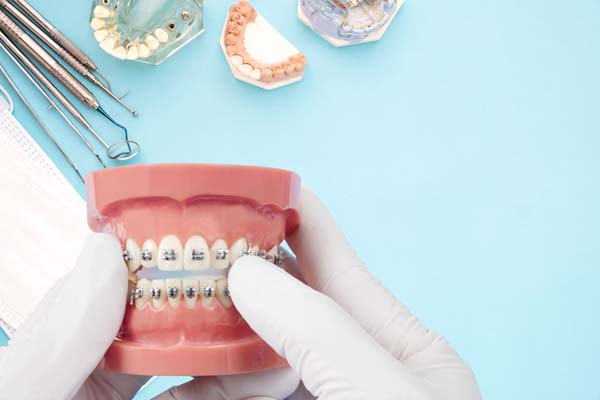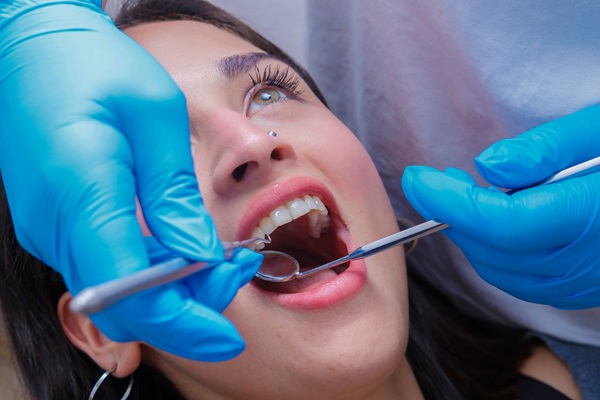Pros and Cons of Braces for Orthodontics

Braces have been used for orthodontics for over a century. They move teeth by applying force on them, slowly pushing them to a better alignment. Braces are made up of brackets that are attached to each tooth and wires that connect all the brackets on a dental arch. Increasing tension in these wires increases the force being applied to the patient’s teeth. Pushing teeth to a better alignment is the idea that powers orthodontics.
About braces
Braces are highly recommended by dentists when it comes to fixing severe bite issues. Treatment times are typically somewhere between one to three years. Braces are easily noticed when worn, however, and that makes some people reluctant to straighten their teeth with them.
Fortunately, more aesthetically pleasing options like ceramic braces have been developed. Ceramic braces have similar parts as metal braces, but the metallic components are replaced with transparent and tooth-colored parts. As a result, it is harder to notice them on teeth.
Pros and cons of orthodontics with braces
Most people think of braces when orthodontics is mentioned. The benefits of straightening teeth with braces include:
- Traditional braces can be used to treat a wider range of orthodontic issues than clear aligners, such as problems caused by a person’s jaw being improperly positioned
- Braces tend to lead to better outcomes compared to clear aligners
- Braces are typically more affordable than clear aligners
- Braces work 24/7, and that can lead to shorter treatment times
- Braces being non-removable can be a plus for the parents of children who need orthodontic treatment
- There is no way that a person can lose their braces
- Braces are more effective at straightening children’s teeth
- Ceramic braces provide decent aesthetics
- Braces are sturdier than clear aligners
However, there are downsides to fixing bite issues with braces. The most common ones include:
- Metal braces can ruin a person's smile
- People who wear braces often must avoid foods that need to be bitten into, like apples or corn, since this can lead to food particles getting stuck underneath the appliance or cause damage
- Braces being non-removable makes it harder to clean teeth and eat during treatment
- Treatment with braces typically requires monthly visits to a dentist
- Braces are more challenging to clean than clear aligners
Braces can get you a straight smile
Braces might not be the most aesthetically pleasing oral appliances used to straighten teeth, but they get the job done. Call or visit our Albuquerque clinic to learn more about how oral appliances like braces can be used to fix problems with your bite.
Request an appointment here: https://albuquerquedentaldesign.com or call Family & Cosmetic Dental Design at (505) 883-3722 for an appointment in our Albuquerque office.
Check out what others are saying about our dental services on Yelp: Orthodontics in Albuquerque, NM.
Recent Posts
Have you chipped a tooth? Read on to learn about the importance of prompt treatment for chipped teeth. You need to reach out to a dental office immediately if you have a chipped tooth. Otherwise, the issue might worsen over time and become more serious. The dentist will examine the tooth and recommend restorative treatment…
Dental bonding and teeth whitening are common dental procedures that improve the appearance of your smile. However, some patients are concerned that their teeth may not have the same shade after teeth whitening, particularly if they have had dental bonding on one or more teeth. This review helps patients deal with this concern. Understanding the difference…
For tooth loss, partial dentures are a good treatment option. This appliance not only revives your smile and appearance, but it can have health benefits as well. Your dentures allow you to chew effectively again and eat healthy foods. Replacing missing teeth will also help to prevent additional tooth loss and bone loss. A partial…
Same-day crowns are now achievable due to CEREC® technology, which combines modern technology with significant advances in dentistry. Patients with fragile, fractured, damaged, or broken teeth may now have their dental condition assessed and even get a new dental crown designed and installed during one visit to the dentist's office. If you are considering CEREC…


